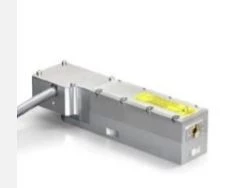SNP-50F-100 High Performance IR Microchip Laser
Description
For generating high peak power IR pulses of a few hundred picoseconds, microchip lasers are economical, compact, and reliable. Sub-nanosecond 1064nm pulses are indeed directly generated from the diode pumped passively Q-switched Nd:YAG microchip engine. Microchips are also easy to operate and service ; controllers can be used with every laser head model and swapped within minutes while conserving constant performances. The SNP series are designed for high average power, either from pulse energies of 20 µJ at 1064nm, or from repetition rates up to 130 kHz.
SNP-50F-100 High Performance IR Microchip Laser
Specifications |
|
|---|---|
| Avg. Power: | 0.19 W |
| Wavelength: | 1064 nm |
| Repetition Rate: | 45 – 45 kHz |
| Spatial Mode (M^2): | 1.3 |
| Pulse Duration: | 0.7 ns |
| Pulse-to-Pulse Stability (RMS): | 3 % |
| Cooling: | Air |
Features
- Repetition rate up to 130 kHz
- Ultrashort pulses down to 600 ps
- Multi-kW peak power
- Excellent beam quality – TEM00, M²<1.1
- Efficient, air-cooled
- Sealed package, extremely long life
Applications
- Material processing
- Cost effective marking solutions
- Graphitization - Instrumentation
- Ranging
- Differential absorption LIDAR
- Super-continuum generation
- Distributed temperature sensing
- Raman spectroscopy - Biophotonics
- Nanosurgery
- Protein cross-linking
For pricing, technical or any other questions please contact the supplier
- No registration required
- No markups, no fees
- Direct contact with supplier
-
Ships from:
France
-
Sold by:
-
On FindLight:
since 2019
Frequently Asked Questions
The maximum repetition rate of the SNP-50F-100 High Performance IR Microchip Laser is up to 130 kHz.
The SNP-50F-100 High Performance IR Microchip Laser can generate ultrashort pulses down to 600 ps.
The SNP-50F-100 High Performance IR Microchip Laser can generate multi-kW peak power.
The SNP-50F-100 High Performance IR Microchip Laser has excellent beam quality with TEM00 and M²<1.1.
The SNP-50F-100 High Performance IR Microchip Laser can be used for material processing, instrumentation, and biophotonics applications such as ranging, differential absorption LIDAR, nanosurgery, and protein cross-linking.

